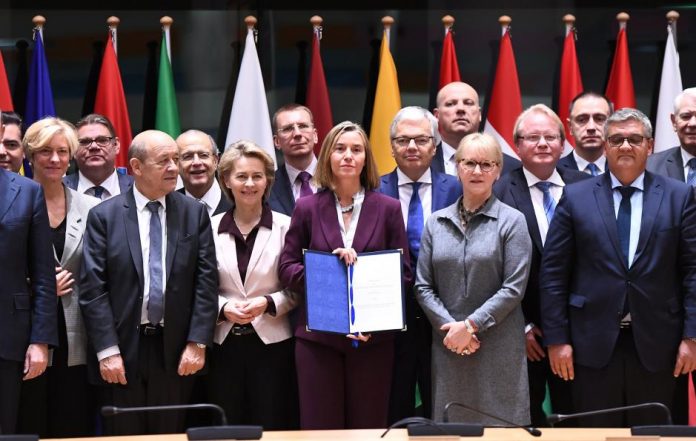Ordinarily, European leaders should understand the essence of the mix between nationalism, military alliances and the pursuit of diplomacy. History books are replete of the role of defence alliances in the causative effects of the two wars the world has seen. The latest move by the leaders of the European Union, EU, tends to draw attention to this mix. Last Monday, 23 European countries signed a landmark treaty aiming to boost cooperation after the episode of the referendum at Brexit. The pact, which is referred to as Permanent Structured Cooperation on Defence Agreement, PESCO, seeks to improve EU coordination on defence and weapons systems development.
Spearheaded by Germany and France, the move is aimed at boosting the morale of the European Union after Britain’s shock decision to quit the union and to add verve to the 5.5-billion euro European Defence Fund. The EU’s diplomatic chief, Federica Mogherini, has welcomed the agreement as “a new page of European defence”, declaring that some countries had already proposed more than 50 projects.
Similar efforts to deepen military links have been frustrated for decades, partly by Britain’s fierce opposition to anything that might lead to a European army. But Brexit and Russia’s annexation of Crimea in 2014 has once again brought the need for a strong European security stance back into focus.
The initial concern of some key political observers is that PESCO will affect the role of the North Atlantic Treaty Organisation, NATO, in Western Europe. However, it is believed that NATO will retain its primary role. However, Mr. Mogherini said the EU could offer resources the alliance does not have, such as navigating security and development issues in Africa. PESCO could, in theory, lead to the creation of a European operational headquarters or logistics base, but will first focus on projects to develop new military equipment such as tanks or drones.
The agreement commits countries to “regularly increasing defence budgets in real terms” as well as devoting 20 percent of defence spending to procurement and two percent on research and technology. Mogherini said that by coordinating their efforts, European countries would get better value for money in defence. “The real issue is not how much we spend but the fact we spend in a fragmented manner,” she said.
The deal also binds countries to provide “substantial support” in areas, including personnel, for EU military missions — an area that has proved problematic in the past. Countries signing up to PESCO will be subject to an annual review to make sure they stick to their commitments — and could be thrown out if they do not. After the ceremony, the deal would be formally launched on the eve of the EU summit slated for next month, at which point it will become legally binding. Paris and Berlin offered competing visions for the pact, with France pushing for a smaller group of nations to commit to ambitious projects including possible foreign interventions such as in Libya or Mali.
New projects will require unanimous approval of all countries signed up for PESCO, making it harder to get agreement on contentious issues. Britain, which is leaving the EU, and Denmark, which has an opt-out in defence matters, did not sign, along with Ireland, Portugal and Malta.
British Foreign Minister, Boris Johnson, said although his country is not taking part in the new deal, the UK saw promise in PESCO and pledged to be “supportive”. Member-states which choose to sit out now can join later – subject to approval by the early adopters. Countries that are not in the EU can also take part in specific missions — opening the way to possible participation by nuclear power, Britain, after it leaves the bloc in 2019 – though it will have no role in decision-making.


















